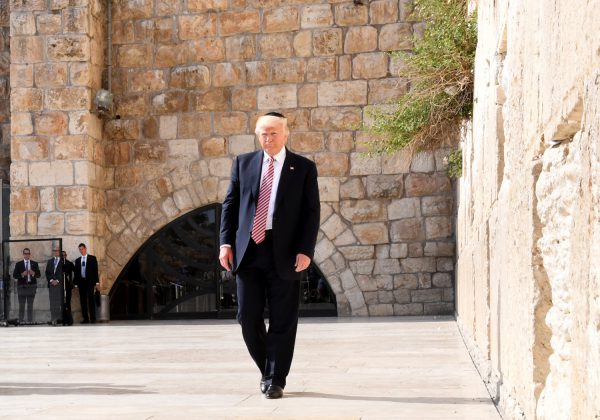ASPI suggests

The world
Donald Trump doesn’t let a week slip by without throwing a spanner in the works. His decision to recognise Jerusalem as Israel’s capital overturned more than two decades of US foreign policy in the Middle East. Brookings analyses the puzzling question of why Trump felt compelled to make that decision, which deviates from the administration’s own Middle East agenda. David Shulman discusses Shimon Peres’ posthumous memoir, which reveals ‘mixed patches of light and darkness’ about a man who played a vital role in the modern history of Israel.
Two nuanced analysis pieces on next steps for Iraq came out this week. Carnegie’s Yezid Sayigh traces three major internal challenges facing Iraqi politics and governance, to suggest how the risk of armed conflict may be mitigated or contained. Veteran Iraq expert Emma Sky, writing for Foreign Affairs, puts the case for a continued US presence in Iraq, urging policymakers in Washington to learn from past mistakes.
Following the killing of Yemen’s ex-president, Ali Abdullah Saleh, an interesting analysis from the New York Times looks at the fates of five of the Arab world’s ‘befallen’ leaders from Egypt, Libya, Syria, Tunisia and Yemen.
It seems that the post-truth era has filtered through even to coup-makers. Claudio Sopranzetti takes a closer look at how the militaries used ‘alternative facts’ to frame the narrative of the coups in Zimbabwe, Thailand and Egypt. Speaking of overstating the facts—new evidence suggests that the Saudis didn’t shoot down the ballistic missile fired at Riyadh by Houthi rebels last month after all. Astonishingly, it looks as though the missile’s warhead may have exploded near the airport’s domestic terminal. The latest ballistic and cruise missile threat report from the US Air Force’s National Air and Space Intelligence Center is out; read it here.
In the New Statesman, Graham Allison explains three elements of China’s President Xi Jinping: Xi the survivor, with ‘iron in his soul’; Xi the strategist, risen to ‘chairman of everything’; and Xi’s statecraft, leading China to stand ‘tall and strong in the East’. To bring Allison’s China forecasts a little closer to home, have a look at this piece from China’s Global Times about Australia’s recent foreign policy white paper and this piece from the Australian about China’s reaction to Australia’s foreign interference laws.
Britain’s Royal Navy looks set to return to the Indo-Pacific. The Asia Times discusses the difficulties of achieving the UK government’s goal of expanding its global footprint with such a small fleet.
Aerial views of Rohingya refugee camps in Bangladesh are innovatively portrayed in this infographic. The images link the practical challenges faced by refugees in the camps (such as hostile terrain, lack of space, contaminated water supplies and access to latrines) with the related health risks.
Australia controversially granted the provocative alt-right British dilettante Milo Yiannopoulos the opportunity to make a speech in Parliament House during his Australian tour. Providing a ‘self-proclaimed troll’ a platform to speak up on the Hill sparked violent protests. The Australian castigates the identity politics police, and an editorial in the Age draws the line between hate speech and free speech.
Tech geek of the week
Nuclear-powered drones could soon be a possibility, as both China and the US develop airborne reactors. Nuclear-powered unmanned aerial vehicles can stay aloft for months, and have more power for sensors and directed-energy weapons like ‘lasers’. Chinese researchers are envisaging such drones operating over the sea, so that ‘if an accident happens, it crashes into the sea.’
A new report is out on how China intends to use AI to leapfrog over the US and gain a decisive edge. It talks about intelligent weapons, battlefield singularities in which AI machines take over, swarming, ‘cognitive radio and electronic warfare’, and a silicon commander working alongside humans in a headquarters.
Finally, if you want to think about possible dark futures, read about ‘the origins of the American military coup of 2037’—a fictional essay out of the US military’s most hallowed hall of learning, West Point. Suggesting a Chinese invasion of the West Coast, after years of neglect of the US military, this is powerful writing.
Videos
This instalment of Vox’s Borders series tells the story of a region between Nepal and China, historically outside the reach of a state, and the people who live there.
Dutch MEP Sophie in ‘t Veld spoke to the BBC’s Newsnight program and made plain her frustration at the vagaries of the UK’s Brexit negotiations.
Take a tour through Jerusalem’s al-Aqsa Mosque in this 360-degree virtual experience from Al Jazeera.
Podcasts
The BBC’s In Our Time history podcast takes a look at Picasso’s Guernica. Melvyn Bragg and a panel of experts discuss the composition and historical events that inspired the haunting masterpiece.
On her politics podcast on The Conversation this week, Michelle Grattan interviews John Blaxland about Australia’s ‘draconian’ new foreign interference laws and the possible unintended consequences for public discourse.
Events
Sydney, 10 December, 1900, Human Rights Watch: Human Rights Day 2017 reception at the Museum of Contemporary Art. Tickets here.
Canberra, 12 December, 1230, ANU: ‘Where should China stand in the international negotiations on intellectual property?’ Details about the seminar here.
Canberra, 13 December, 1730, ANU: ‘Women, peace and security: a new global index launch’. Register for the event here.
Melbourne, 14 December, 1800, Australian Institute of International Affairs: ‘Separatism as a global issue’, a conversation with Professor Damien Kingsbury and Richard Iron. Tickets here.